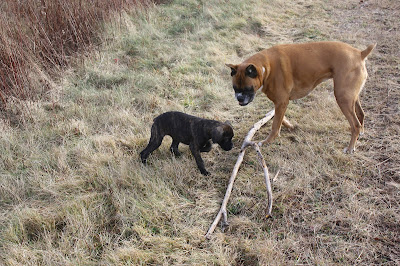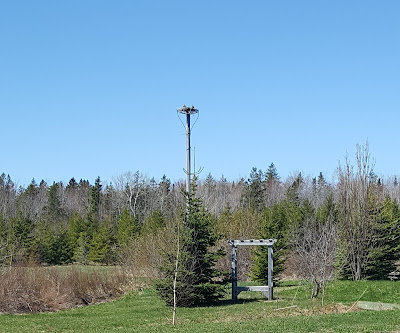We had so much fun raising a chick with surrogate hen Phyllis that when she went broody in May again, I stuck three eggs underneath her. It takes 21 days to hatch a chick out of a viable egg; one egg broke early on but chicks hatched out of the two remaining eggs -- one on a Friday and one on the Saturday but neither thrived. The chick died almost immediately. The second one made it into the nursery but couldn't walk properly; it kept falling over.
I think Phyllis killed. It had blood on it when I went to check on the pair of them, and Phyllis wanted back in the coop where she went right back to the nest box she'd been sitting in for three weeks.
So I put four eggs underneath her this time; by the end of the three weeks, we were down to one. I don't know if the eggs break by accident, or because they weren't fertilized so no one is growing in them.
I happened to be standing in the doorway of the coop when suddenly, Phyllis flew off out of the nest box and took off outside to have a dirt bath.
I checked and the egg had pipped -- there was a hole that the chick had broken open.
I fetched Phyllis back inside and as I put her back into the nest box, she stepped on the egg/chick so there it was.
Phyllis was such a good mom last year, I trust her instincts; I assume she knows what she's doing. It's nature and natural, after all. No one needs my help.
Last summer, our one chick that hatched was good right from the start, and within an hour was starting to fluff up and cheep and sit underneath Mom. These three chicks never seemed to have their legs working. When I checked on Phyllis and the chick, after supper, she didn't have it under her -- it was sitting to one side, wet and cool.
So I scooped it up and figured I'd hold it until it died.
Eventually, Dwayne came to see why I was sitting on the step of the coops.
"Just put it back under Phyllis," he said.
"But she will ignore it. She might kill it."
So I took it into the house, waiting for it to die.
It didn't die. The warmth of my hand kept it going. So I thought, well, you never know, maybe it's just runty and needs more TLC than Phyllis is prepared to give. I looked up how to feed it and discovered that a chick doesn't need food for 24 hours, at the outside 48, since it eats the egg inside before it hatches out.
Something like that.
So I held it in my hand all night, keeping it warm. I lined a berry box with tissue and feathers, and whenever I placed it inside -- in order to go to the basement to clean the kitty litter or have my bath -- it cheeped strongly. But I couldn't get it to stand up, and it's eyes were closed.
We slept upstairs in the spare room so I could close the door and keep the cats out; eight hours with a chick lying in my hands. My poor shoulders! I barely slept but the chick survived the night.
There was no miracle improvement, though; her baby feathers fluffed up but her legs wouldn't hold her up.
All day Saturday, I kept a glass bowl with a lid half-filled with hot water -- all the chick needed was warmth; when she was cold, she cheeped. This is what chicks do: they cheep for their mother, they cheep when they're cold and when they're hungry. When I worked upstairs in my office, my little chick sat on my hand, eyes closed, resting her head on my thumb since she could only hold it up a few seconds.
Mostly, she lay around in the box on the warm bowl, or in my hand. She liked to sit up, on her bum. I think she wanted to be well, she wanted to be moving around but her legs wouldn't let her. She couldn't hold her head up. This was similar to the second chick from the first hatch, but it was able to stumble around a bit before it fell over. It didn't appear likely this one would ever walk; she just flopped over as soon as I stopped propping her up.
I tried to feed her a couple of times throughout Saturday but she didn't respond to the stimulus of dipping her beak in mushy food/water.
She just wanted to be held. Comfort. Could she feel the pulse in my thumb? Could she feel my breathing as she lay against my stomach? Was it simply my living energy she sensed?
When I wanted to have a bath, Dwayne held her and they watched TV together. She didn't cheep; she was content to be held in his hand.
But I couldn't do another night like Friday night, and I couldn't wake up every half an hour to heat the water; I needed my sleep, and I had a church service to do on Sunday morning. She'd have to sleep in her box in our bathroom (protected from the cats). So at bedtime, I cozied up her box even more and put the box on a towel in the bathroom sink; if she crawled out, she'd be safe. She cheeped loudly for a long while, breaking my heart, but she survived the night again.
And she did indeed crawl out, looking for heat. Looking for me, for the breathing, for the energy? She was wedged between the side of the sink and towel. I thought she was dead; her body was cool but she was alive. She would have been much cozier in the box.
I couldn't believe she was still alive. Such a strong little chick.
Her legs still wouldn't hold her, though, and the left one was starting to cross over the right; did Phyllis break its hip in the nest box when she stepped on the egg? Whatever happened, this chick was not going to walk and she wasn't eating. Her eyes weren't open either. She simply wasn't thriving and she wouldn't improve.
So I made the decision to begin comfort care. I would keep her warm but not hold her any longer; I'd let her pass away. She cheeped every so often, but by mid-afternoon, she'd stopped cheeping, then she stopped moving when I pulled back the cloth to check on her.
She died at suppertime, 48 hours after she was born.
After supper, I buried her in the new garden along the back deck; next year, she'll come up as lily of the valleys.
I thought a lot about this: Did my interference cause this? If I had just left the coop, let Phyllis have her dirt bath, let the chick hatch out on her own time, would this chick be fine today? Did I mess up the natural hatching process? Does the mother always leave the chick to hatch by itself, or did Phyllis know she had a quick moment to get outside and poop and drink some water and roll in the dirt before heading back into the chick?
Did my interference cause Phyllis to injure the chick? And how did Phyllis know it wasn't viable so soon? If I had left it in the nest box with Phyllis, would it have died quicker, would she have put it out of its misery sooner -- when it was too young to know anything more?
I will never know if I screwed up or if this was just the way it was going to happen. I do know next time, I'll let nature -- and Phyllis - do it their way, without my useless human help.
I felt bereft all day Monday. I missed my little friend. She was fuzzy and warm, and she cheeped. It was fun to have her around, and I'd been looking forward to the chick experience again. I was quite willing to have a blind chicken as a pet, but not one that couldn't walk or had to be forced to eat (if that was even possible).
I buried her with the tissues and the feathers, and some sweet-smelling clover and daisies. I lay her down on leaves from my bleeding heart plant.
I never let anything I bury - hen or bird or chipmunk - lay on the cold dirt or be covered directly by dirt. Everyone gets a respectful burial from me. A life, however short, is honoured.
I usually bury my birds and animals in the field but I wanted this little chick near the house where she spent her first and last days on earth.
"Thank you, little chick," I said. "It was nice spending the weekend with you."
She looked the same in death as she did in life, curled up, legs tucked in, a little fluff ball, sleeping.





































